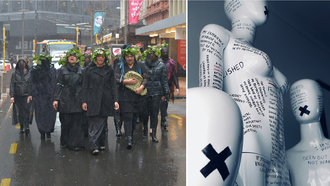-
Let's get a dog park at the new Green Road Reserve in AucklandRodney Local board are currently asking "If you were building a new park the size of Auckland’s Cornwall Park, what would you put in it?" They are currently seeking feedback until 21st September 2018. There are over 100,000 registered dogs in Auckland and 33% of them are located north of the Harbour Bridge. One of the key elements of animal welfare for dogs is regular exercise so having dedicated dog areas is important to give dogs the best chance of being well behaved. Also important is to have off leash exercise areas as this helps to have good dog social encounters (this does not always happen if dogs are on lead) and for dogs to have maximum enrichment opportunities while being exercised. Having a fenced dog park within the dog exercise area would also help those with young or new dogs in developing recall when off lead and allow you to train your dog in a safe environment. We believe that Christchurch has great dog parks and dog exercise areas including The Groynes, Victoria Park and Bottle Lake Forest Park. Many are fenced and feature agility equipment. It would be fantastic to get something similar for Auckland dogs and their families to use. In the last year Auckland dog owners paid Auckland Council over $8 Million dollars in dog registration fees. It would be encouraging and positive for those who pay their dog registration fees to see their money being invested in an asset that they can use with their dogs. If you'd like to find out more, or to complete council's feedback survey on what should be part of this reserve, then just click on this link below: http://ourauckland.aucklandcouncil.govt.nz/articles/news/2018/8/help-shape-tomorrow-s-park/585 of 600 SignaturesCreated by Claire Teirney
-
Dear Winston, let's double the refugee quota and do our bitThe Government already has plans underway to support the small number of families that will come with a rise in the refugee quota. The opening of facilities in Invercargill and Christchurch will make it easy to meet the needs of people granted refuge in New Zealand.[2] What we really need to do is fix both the housing crisis and help those in need. We could be taxing extreme wealth in individuals and corporations so the government has enough money to do both. Millions of people around the world are looking to rebuild their lives where it’s safe. To raise our refugee quota from 1000 to 1500 is still a small number compared with other countries - even Australia accepts many times more people seeking refuge than New Zealand per capita.[3] With 60 million people around the world looking to set up a safe home, an increase from 1000 to 1500 is a small number for us, but will mean the world for those people.[4] Email the Rt. Hon. Winston Peters to urge he gets behind lifting the quota. Use the email template to send a quick message. 1. NZ is a long way off its international aid commitment, but is moving in the right direction https://www.stuff.co.nz/national/politics/103751999/nz-is-a-long-way-off-its-international-aid-commitment-but-is-moving-in-the-right-direction 2. Invercargill chosen as new refugee settlement location https://www.immigration.govt.nz/about-us/media-centre/media-releases/invercargill-chosen-new-refugee-settlement-location 3. Fixing NZ's 'dismal' refugee figures https://www.news.com.au/world/breaking-news/fixing-nzs-dismal-refugee-figures/news-story/d5ad0c7d3c6a7d17d0642fc5767a924f 4. Figures at a Glance http://www.unhcr.org/figures-at-a-glance.html Also: Winston Peters declares U-turn on Government's plan to boost refugee quota https://www.newshub.co.nz/home/politics/2018/09/winston-peters-declares-u-turn-on-government-s-plan-to-boost-refugee-quota.html NZ works to double refugee quota as others close their borders https://www.stuff.co.nz/national/politics/104837520/NZ-works-to-double-refugee-quota-as-others-close-their-borders Winston Peters: NZ should increase refugee numbers https://www.nzherald.co.nz/nz/news/article.cfm?c_id=1&objectid=11451314744 of 800 SignaturesCreated by Team ActionStation

-
Appoint a Minister for Rainbow IssuesAppointing a Minister for Rainbow Issues would be a major step forward in establishing true equality for our LGBTI+ communities. It would make New Zealand more inclusive of its diverse communities. It would make a clear statement to LGBTI+ people that they are being treated as the equals of other citizens and residents of this country. It would streamline the way, in which LGBTI+ issues are handled by the Government and it would ensure that such matters are handled by a representative, in whom they may have confidence. It would enable such matters to be handled with competence and continuity and it would enable LGBTI+ people to see that this is so. It would make it easier for the Government to consult with LGBTI+ communities. It would give transparency to the handling of LGBTI+ issues and it would demonstrate yet again that New Zealand is a world leader in social equality and fairness. As an example the Government of the Australian Capital Territory has an Office for LGBTIQ Affairs. http://www.cmd.act.gov.au/policystrategic/the-office-for-lgbtiq-affairs46 of 100 SignaturesCreated by Frank Boulton
-
Safer Three Kings: No More Bottle StoresAlcohol Healthwatch estimates alcohol-related harm in New Zealand costs $14.5m each day. The brunt is disproportionately on youth, Maori and Pasifika in our communities, and there is a link between high density of off-licences and the heavier drinking patterns that result in much of the harm. Harm includes the health of the drinker themselves, such as increased rates of cancer and fetal alcohol syndrome, as well as harm to others, with alcohol playing a direct or indirect role in many fire fatalities, drownings, suicide and self-inflicted harm deaths, and the growing road toll. 43% of all alcohol is sold from off-licences, like the one proposed. This Super Liquor would be a large store, the size of the old bed shop, likely focused on selling bulk amounts of alcohol at low prices. It would increase the amount of alcohol in our community when we need to limit supply, and in particular reduce sales from off-licences where the liquor is then consumed in unsupervised circumstances (in contrast with on-licences). Three Kings already has a large number of off-licences and problems with anti-social behaviour as a result of alcohol abuse. There have been repeated incidents of violence and abuse in the carpark across the road from the proposed site, at 546 Mt Albert Rd, with alcohol playing a role. Several nearby shops, including existing bottle shops, have been violently robbed in particular the Liquor Legends on Duke St and the Crown Superette on Melrose Rd. Local schools and parks end up vandalised and littered with broken glass, as people drink alcohol purchased at bottle shops in public despite liquor bans. Resources of both council and schools have to be used to clean up the mess, when some of it could be avoided by reducing the sale of alcohol in the area. There are a number of local sites of cultural importance where anti-social behaviour fueled by alcohol would be inappropriate, including places of worship such as the almost adjacent Three Kings Congregational Church, and Ranfurly Retirement Village which is a war memorial to the Boer War and thus a place of remembrance as well as home to some of our more vulnerable older people. Finally, the District Licensing Committee process allows people to make submissions to object to the application, and this petition is an important opportunity for those who can't make a submission to still be able to show their opposition. It is possible there will also be a hearing on this application, particularly if the petition is signed by a lot of locals, which will provide another opportunity for the local community to have a say. There was a public meeting on Friday 7th September to discuss it, and there will be another one to plan further on Friday 12th October, 7pm, at the Waikowhai Room, Fickling Centre, 546 Mt Albert Rd (underneath the Mt Roskill Library and opposite the proposed site).320 of 400 SignaturesCreated by Julie Fairey
-
Stop multi-nationals profiting from our natural water resourcesOur Overseas Investment Act allows 'jobs, exports productivity and additional capital investment' to take absolute priority on any decisions made regarding our resources, natural or otherwise. These are apparently 'substantial and identifiable benefits'. This petition is founded on the concept that the health of our waters, our planet (in respect to production methods of plastic bottles, access to groundwater, and bottles destined for landfill at the very least) our iwi, and in fact everyone who relies on things like water and planets to live well, factor in as 'substantial and identifiable' points of consideration. There may be up to 60 jobs created over four years as a result of this operation, but at the risk of polluting sensitive land and further severing trust and relationships with tangata whenua. The 'jobs' and 'capital' arguments are the very same arguments employed again and again throughout history in spite of tangible damage to land and water, that often cannot be repaired. We are in the midst of a climate crisis, we are in a recycling and landfill crisis, and our waters are one of the most threatened aspects of the collective health of our country to date. Over one billion litres of water each year hold infinite value in ways that cannot be measured in jobs and capital. Let's not turn something pristine into a product that ultimately expands landfills, and further insults the deepest priorities we face right now, and let's prevent this from continuing to happen via outdated laws. Please also sign: https://our.actionstation.org.nz/petitions/stop-the-sale-of-otakiri-springs-to-chinese-bottling-giant-nongfu Overseas Investment Act: http://www.legislation.govt.nz/act/public/2005/0082/latest/DLM356881.html?search=ts_act_overseas+investment&sr=1 https://www.stuff.co.nz/business/104651548/overseas-investment-for-otakiri-springs-bottling-giant-approved-in-principle2,060 of 3,000 SignaturesCreated by Yasmeen Maria
-
Help end period poverty - subsidise menstrual cupsWe are three young women (Kacey, Chloe, and Heleana) running a campaign called Menstrual Mana. The important social issue we are working on is making menstrual cups more affordable and accessible to the vulnerable - in particular, making menstrual cups free for girls who attend decile 3 or lower schools. Menstrual Cups are a new product which were developed to help diminish the high pollution rates caused through other menstrual products such as pads and tampons. “The average woman uses roughly 11,000 tampons in her lifetime. The time it takes for a tampon or pad to degrade in a landfill is centuries longer than the lifespan of the woman who used it, particularly when wrapped in a plastic wrapper or bag. In addition, the process of manufacturing these products – turning wood pulp into soft, cotton-like fibres – is both resource- and chemical-intensive” (Rosie Spinks 2015, The Guardian). However, even though menstrual cups reduce pollution, they’re also triple in price of a box of tampons/pads. The price of menstrual cups is an issue for many women in New Zealand, especially women who are still at school and don’t receive an ongoing income. Sign this petition to show support towards Menstrual Mana's hope in making Menstrual Cups free for women who are in decile 3 or lower schools. Period poverty 'a human rights issue' - https://www.tvnz.co.nz/one-news/new-zealand/period-poverty-human-rights-issue-says-green-mp-golriz-ghahraman-some-girls-miss-school?auto=5825163987001425 of 500 SignaturesCreated by Heleana McNaught
-
Call to Parliament for improved access to the residential care subsidyMy name is Grace Taylor. I am the daughter of a mother suffering from Alzheimer's / Early Onset Dementia. Mum is 1 of the 60,000 people in New Zealand currently affected by this disease. A statistic set to triple in New Zealand by 2050.[1] In March 2018, my mother’s health deteriorated and as a result, medical professionals advised my brother (who lives in Australia) and I that our mum required full time care by skilled professionals. We made the heartbreaking decision to admit our mother into a residential care home. A bigger hit came in May 2018, when my mother fell victim to unfair legislation that is crippling our family to financially provide for the quality care that my mother so rightly deserves. Two months after mum's condition required her to be admitted into full time care, mum’s application to the Ministry of Social Development for the residential care home subsidy was denied, in full and stood down to reapply again for another 4 years. This is due to the strict, blanket criteria of the eligibility for this subsidy. More specifically the criteria around the income and asset testing of applicants. Anyone’s loved ones could require residential care for many health reasons. As of 30 June 2018 there were 31,566 people aged 65+ in long term aged residential care. In addition there were 550 in respite care, for a total of 32,116. There are a further 1271 “Other residents” in living in aged care facilities but who don’t qualify for aged residential care ie “people fully funded by ACC or people with long-term conditions who are not assessed for aged residential care”.[2] Papers released under the Official Information Act show that each year around 1000 people with assets or income over the threshold receive no government help to pay weekly residential care costs that can reach over $1000.[3] "The asset base that you have to fall below to qualify for the subsidy is, I would argue, really quite low. We get a lot of people saying to us, look I just didn't know that dementia would be this expensive. It really costs people a lot of money." - Paul Sullivan, Chief Executive Dementia NZ I went public with my mother’s story on social media in May 2018. Within 24 hours - 10 NZ families contacted me directly with very similar stories for their loved ones with that have required residential care home to care for their loved ones. And there are so many more. With the denial of her residential care home subsidy due to the asset and gifting threshold set by the Ministry of Social Development, my mother has been stood down for 4 years to receive any financial support for her care home fees. Leaving my brother and I to pay her $4900 monthly fees, for the next 4 years. I am a single mother, I work full time, have a mortagage, and the only benefit I receive from the government is the OSCAR subsidy for my son’s after school care. Since March 2018 I have been had to take out personal loans, and rely on contributions of my brother, mum’s minimal pension, and my salary to pay $890 a fortnight for our family home mortgage, and $4960 a month for mums care home fee. As of August 2018, I can no longer maintain these costs. As a result we have been forced into a decision to sell our family home, of 40 years, in order to fund mums care over the next 4 years. A home that was the only place that was familiar and safe to my mother as her dementia took hold, a home I have been raising my son, a home that was my mother’s only material asset, a home that my mother worked 3 jobs to own and provide as security for her children. This is now being taken from us. My mother has never received a benefit from the government and has worked 2 sometimes 3 jobs for over 40 years to provide for us. I have followed all the formal avenues and processes with my local MP, Ministry of Social Development and Ministry of Health. Having received responses from each minister directly it became very clear that what needs to be addressed is the legislation around the residential care home subsidy. This is my call, on behalf of many voices, for that action. Please raise your voice with me. Fa'afetai tele lava. To read more about the detailed bigger picture of my family's story please visit: https://www.radionz.co.nz/news/national/363396/families-of-dementia-sufferers-face-huge-bills Tagata Pasifika feature story: https://www.youtube.com/watch?v=27r-EA0JSJY&t=7s Here is my open letter to NZ in response to our situtation. https://www.facebook.com/grace.taylor.5437923/videos/1627972693991555/ References 1. As stated in the report Economic Impact of Dementia (2016) by Deloitte & Alzheimer's New Zealand 2. New Zealand Aged Care Association 3. Radio New Zealand, 6th August 20184,240 of 5,000 SignaturesCreated by Teuila Taylor
-
Tell the government to include ALL survivors of institutional abuse in Royal CommissionThe final terms of reference for the Royal Commission are about to be announced. The Royal Commission has been set up initially to investigate survivors abused in state care up until 1999. We support those survivors and want them to have justice. But we know this would exclude the large group who were abused in the care of other institutions, especially churches, and survivors after this date. These people went through the same experience and deserve justice too. We have many survivors in New Zealand that were abused by members of their church. The abusers have been hidden and protected by the churches, while the survivors have had to deal with the fall out of their childhood abuse. Alcohol, drugs, violence, family issues and failed relationships are common outcomes. A disproportionate number of survivors end up in prison while their abusers walk free. At the moment, these survivors' only option is to expose themselves to the further trauma by reporting their abuse to the Police or returning to the church which allowed the abuse to happen. Often nothing can be done because the burden of proof is so high. It has been suggested that churches could run their own inquiry. This would be impossible. Survivors would have to return to the institutions where they were abused and traumatised. Churches have a history of protecting abusers at the expense of victims. The Royal Commission was set up so state abuse survivors had a safe place to report their abuse and seek justice. We want the same for other survivors of institutional abuse. The Royal Commission can also use its power to hold institutions to account and recommend changes to prevent future abuse. An inclusive inquiry will give the opportunity to prevent future abuse in NZ institutions. This is supported by the network of survivors of abuse in church based institutions, and their supporters. Facebook: https://www.facebook.com/NZfaithbasedsurvivornetwok/ Church's failure 'serious' https://www.odt.co.nz/news/dunedin/churchs-failure-serious Inquiry into abuse in state care https://www.beehive.govt.nz/release/inquiry-abuse-state-care363 of 400 SignaturesCreated by Network of survivors of abuse in faith based institutions
-
Reconsider the purchase of the P8sThe New Zealand government is about to spend $2.3 billion to buy four Boeing P-8A Poseidon maritime patrol aircraft, replacing six old P-3K2 Orion planes.[1] The planes are due to be delivered and begin operations from 2023. These planes are designed to hunt submarines and signals a troubling shift in foreign policy, moving away from an independent stance.[2] The P8s are war-fighting planes and as such will spend much of their time overseas on exercises with Five Eyes partners (an intelligence alliance comprising Australia, Canada, New Zealand, the United Kingdom and the United States), or on coalition missions, most likely in the Middle East. They will be less available for what we really need - for fisheries patrols or search and rescue over our Exclusive Economic Zone, the Southern Ocean and the South Pacific. There are plenty of maritime surveillance planes with high technical specifications that can be purchased for less than $100 million.[3] The $2.3 billion to be spent on the P8s could be saved for much needed social spending such as increasing wages for teachers and nurses, building houses and fixing our health and mental health systems. The New Zealand P8s will be fitted out with surveillance systems, communications platforms, and weapons targeting, all geared to work in tandem with the American and Australian P8s. In effect they do the same job. The P8 purchase can only be interpreted as siding militarily with America, against China. These surveillance planes, optimised for anti-submarine warfare, are only useful to fight alongside America in a major war. The purchase of four signals an even closer military alignment with the United States, and reflects badly on our non-aligned status. Sign to show your support for New Zealand is as an independent player, acting as a mediator, peacemaker and a general advocate of progressive policies. 'The officials considering our national maritime patrol requirements concluded that New Zealand does not need to maintain a maritime patrol force that includes an anti-submarine capability.' Prime Minister Helen Clark, 2001 World BEYOND War is a new global nonviolent movement to end war and establish a just and sustainable peace. We aim to create awareness of popular support for ending war and to further develop that support. We work to advance the idea of not just preventing any particular war but abolishing the entire institution. We strive to replace a culture of war with one of peace in which nonviolent means of conflict resolution take the place of bloodshed. https://worldbeyondwar.org References 1 - Govt to spend $2.3b on planes to replace aging fleet https://www.radionz.co.nz/news/political/361421/govt-to-spend-2-point-3b-on-planes-to-replace-aging-fleet 2 - New sub-killer planes may never fire in anger but Govt wants the option https://www.stuff.co.nz/national/politics/105452173/New-sub-killer-planes-may-never-fire-in-anger-but-Govt-wants-the-option 3 - Canada’s Field Aviation provides such planes for clients including Australia and Sweden. http://www.fieldav.com/ Comment: Campbell: Five reasons not to spend billions replacing P-3s http://www.scoop.co.nz/stories/HL1807/S00058/campbell-five-reasons-not-to-spend-billions-replacing-p-3s.htm Splashing $2.3bn on aircraft erodes NZ’s independent foreign policy https://thespinoff.co.nz/politics/14-07-2018/splashing-2-3bn-on-aircraft-erodes-nzs-independent-foreign-policy/ New Defence purchase deserves close scrutiny https://www.radionz.co.nz/news/on-the-inside/361568/new-defence-purchase-deserves-close-scrutiny Editorial: $2.3b Poseidon purchase is a questionable adventure for Defence Force https://www.stuff.co.nz/dominion-post/comment/editorials/105375361/editorial-23b-poseidon-purchase-is-a-questionable-adventure-for-defence-force95 of 100 SignaturesCreated by WORLD BEYOND WAR AOTEAROA NEW ZEALAND

-
Uphold the UN recommendation that there is a Royal Commission of Inquiry into the NZ Family CourtLet's Listen to the Experts New Zealand’s EEO Commissioner Jackie Blue, recently recommended a Royal Commission of Inquiry into New Zealand’s Family Court, a call that was repeated by the United Nations CEDAW Committee following a review of New Zealand’s response to the human rights of women. Minister Andrew Little however, in a unilateral decision announced on the day the CEDAW recommendation was released, stated that New Zealand would NOT hold a Royal Commission of Inquiry, but would instead continue with the proposed review of the 2014 Family Court reforms. We strongly believe that New Zealand needs to follow the UN’s recommendation. Allowing the Family Court to continue to function in the way that it has, constitutes state funded abuse, resulting in serious violations of the civil, political, economic, social and cultural rights of women and children who have experienced violence and abuse. CEDAW commented: ‘The Committee is concerned about the apparent crisis within the Family Courts system, reflected in mistreatment of women, particularly women victims of domestic violence’. We Urgently Need A Royal Commission To Clean Up The Family Court Our violence and abuse statistics are shameful. The Family Court is an integral part of the system that responds to violence and abuse. It needs to respond safely in these cases, and it is not. The Backbone Collective's five reports produced over the last 18 months have highlighted that there are systemic failures where women and children are being marginalised in the NZ Family Court, and these failures are supported by a culture that condones violence. It is pertinent that only four hours before CEDAW’s recommendations were released, Judge Connell, a Hamilton Judge, was quoted by The NZ Herald. His comments were shocking and disturbing and provide an example of the thinking we experience from those working in the Family Court. “Often dads who indulge in violence are not necessarily bad fathers and, in fact, they do have a bond with their child... And as soon as you start putting people inside and remanding in custody you're breaking that bond. And that damages children badly." We know first-hand what is wrong with the current system. Our children suffer under orders of the Family Court. We suffer and are repeatedly endangered by the Family Court system. It is not safe for us to speak out individually, but The Backbone Collective has surveyed hundreds of New Zealand women who have experienced violence and abuse who used the Family Court, and their findings are detailed in their reports available online. Shocking detail about the unsafe practices and decisions coming out from the court has been revealed – abused women and children feeling controlled, frightened, terrorised, put down, silenced and punished for speaking out about the abuse in the Family Court. Women described the Family Court as having an enormous and negative impact on their finances, and their physical and mental health. Why is it that the New Zealand Government have known about what is happening in the Family Court for many years, but are continuing to choose to do nothing effective, thereby neglecting its duty of care to protect women and children from harm? What's Wrong With Andrew Little's Plan To Just Have a Review We know, as indeed does CEDAW, that the proposed review of the Family Court reforms of 2014 will go nowhere near deep enough to expose what has been happening. New Zealand’s system of government requires that an inquiry into the operation and culture of the Family Court simply cannot be done by a Ministerial Review such as the one the Government is about to announce. Only a Public Inquiry or a Royal Commission can do this. There must be powers to subpoena witnesses, interview judges and other court officials, and review case files, decisions and orders. This cannot be achieved under the Governments proposed review. The proposed Review of the Family Court is focused on the legislative reforms made in 2014, but the problems women are telling Backbone about, have been happening for many years before the 2014 reforms. Furthermore, only a Public Inquiry or a Royal Commission can provide a safe way for women and children who have experienced violence and abuse, to make submissions, and to give evidence of their experiences in the Family Court without fear of negative repercussions. Why Our Request is Urgent There is urgency in our petition as the likelihood of punishment for speaking out about the Family Court is now becoming more formalised - there is a Reform Bill currently before parliament seeking to strengthen contempt of court legislation, which will make it even easier to punish those who critique the court or the judiciary, with the possibility of a jail sentence. Things need to get better – not worse. Let’s Do This It is abhorrent that with each day that passes, while our government chooses to ignore the recommendation of the UN to undertake a Royal Commission of Inquiry, more and more women and children in New Zealand are abused by the system that is supposed to make them safer. You can read more about CEDAW's recommendations https://tbinternet.ohchr.org/_layouts/treatybodyexternal/Download.aspx?symbolno=CEDAW%2fC%2fNZL%2fCO%2f8&Lang=en and The Backbone Collective reports https://www.backbone.org.nz/reports/2,014 of 3,000 SignaturesCreated by The Backbone Collective
-
Save the Bromley Bus ServiceAs a result of decisions made through Environment Canterbury’s Long-Term Plan 2018-28 process, it has been decided the 145 route that currently runs from Westmorland to Eastgate will be changed. The proposed options for public transport in the draft Long-Term Plan included that the six lowest-performing bus routes in Christchurch would be discontinued. Over 700 submissions were received about the public transport proposals, including many verbal submissions at the hearings held in late April and early May. These submissions were considered by the Councillors before the decisions about the final route changes were made. The new solution includes changes such as reducing frequency instead of entirely removing routes, and redirecting existing routes. Despite the new solution being reached, the section of the 145 bus route that currently services Bromley is still set to be discontinued. These changes are expected to be implemented in October 2018. There is a high level of concern from residents and businesses regarding the discontinuation of the Bromley end of the 145, so Environment Canterbury are going to consider whether it might be possible to retain any level of service for this area at the same time. An update on these options will be shared with the Environment Canterbury Council in August 2018. We are calling on Environment Canterbury to retain public transport services in our neighbourhood, as the walk to reach alternative bus routes is not manageable by many of the people who currently use the 145. It's not practical for people with mobility limitations to make the walk. We fear that without the vital bus service link to places such as Eastgate and the associated social experiences and essential services that some people, particularly the elderly, will become more socially isolated. This petition has been organised by staff and users of the Bromley Community Centre, 45 Bromley Road. Please sign the petition to add your voice.202 of 300 SignaturesCreated by Emma Shaw
-
Give me room - a campaign for a safe passing ruleClose passing is intimidating, dangerous, and in the worst cases life threatening for people on bikes and foot. The NZ Road Code recommends 1.5m: “Give cyclists plenty of room when passing them. Ideally, allow at least 1.5 metres between you and the cyclist”, but this lacks the force of law. Bike lanes are great but they don't go everywhere. People on bikes need the protection of the law. More at https://can.org.nz/givemeroom Safe Passing Rule FAQ at http://cyclingchristchurch.co.nz/2015/11/13/mythbusting-what-a-safe-passing-rule-means/3,427 of 4,000 SignaturesCreated by Patrick Morgan, Cycling Action Network

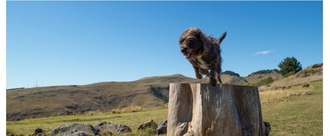
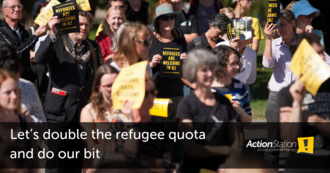.png)

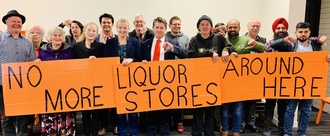

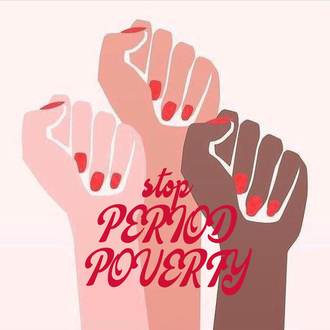

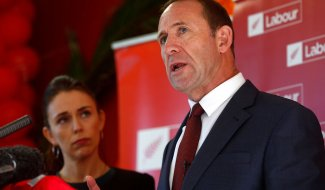.png)

